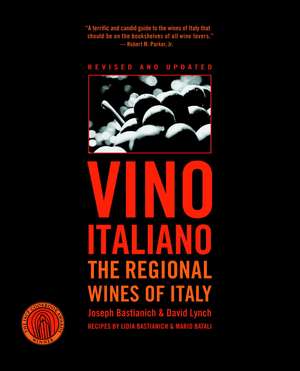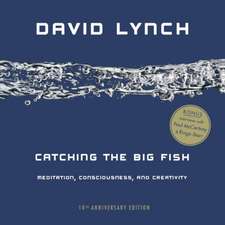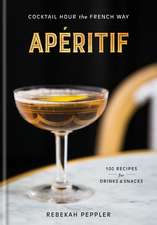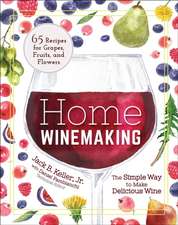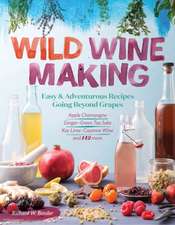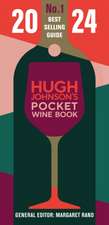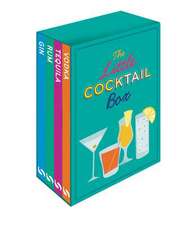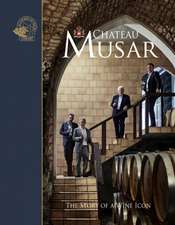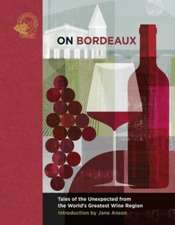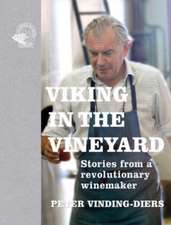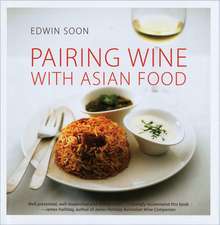Vino Italiano
Autor Joseph Bastianich, David Lynchen Limba Engleză Paperback – 29 sep 2005
Vezi toate premiile Carte premiată
IACP Crystal Whisk Award (2003)
Vino Italiano is the only comprehensive and authoritative American guide to the wines of Italy. It surveys the country’s wine-producing regions; identifies key wine styles, producers, and vintages; and offers delicious regional recipes. Extensive reference materials—on Italy’s 300 growing zones, 361 authorized grape varieties, and 200 of the top producers— provide essential information for restaurateurs and wine merchants, as well as for wine enthusiasts.
Beautifully illustrated as well as informative, Vino Italiano is the perfect invitation to the Italian wine experience.
Preț: 147.90 lei
Preț vechi: 185.44 lei
-20% Nou
Puncte Express: 222
Preț estimativ în valută:
28.30€ • 29.44$ • 23.37£
28.30€ • 29.44$ • 23.37£
Carte disponibilă
Livrare economică 24-31 martie
Livrare express 08-14 martie pentru 82.41 lei
Preluare comenzi: 021 569.72.76
Specificații
ISBN-13: 9781400097746
ISBN-10: 1400097746
Pagini: 531
Ilustrații: Illustrations
Dimensiuni: 185 x 231 x 38 mm
Greutate: 0.79 kg
Ediția:Revised and Upd
Editura: Clarkson N Potter Publishers
Locul publicării:United States
ISBN-10: 1400097746
Pagini: 531
Ilustrații: Illustrations
Dimensiuni: 185 x 231 x 38 mm
Greutate: 0.79 kg
Ediția:Revised and Upd
Editura: Clarkson N Potter Publishers
Locul publicării:United States
Notă biografică
JOSEPH BASTIANICH is co-owner (with Mario Batali) of Babbo, Esca, Lupa, and Italian Wine Merchants, as well as (with Lidia Bastianich) Becco and Felidia, and has published extensively on the subject of Italian wine. He lives in Greenwich, Connecticut.
DAVID LYNCH is the wine director at Babbo and has been a senior editor at Wine & Spirits. He lives in New York City.
DAVID LYNCH is the wine director at Babbo and has been a senior editor at Wine & Spirits. He lives in New York City.
Extras
La Cucina
Food for the Wine
recipe by Mario Batali
Calabria
Like their neighbors in Basilicata, Calabrians relied on heat from peperoncini to spice up an otherwise poor cuisine. Calabria's best-known wine, Cirò, is a red that can stand up to a slight chill, and has a savory character that gives it an affinity for dishes with a little bit of heat. Cirò's soft tannins make it an especially good choice for spicy dishes, since tannins in wine tend to amplify hot spices.
Don't be afraid to throw a bottle of Cirò on ice a half-hour or so before serving the dish below: once you try it, the combination may become a regular part of your summer barbecue repetoire.
Peperoncini alla Calabrese
Serves 4
12 red or green Italian frying peppers or cubanelles
1/4 cup plus 2 tablespoons extra-virgin olive oil
6 cloves of garlic, sliced paper-thin
2 cups fresh bread crumbs
1/4 cup chopped Italian parsley
salt and pepper to taste
1 teaspoon red chili flakes
1/2 pound young provolone cheese, grated
Preheat the oven to 450°F.
Make an incision in each of the peppers from the stem 2 inches down towards the point. Carefully remove the ribs and seeds as best you can and set the peppers aside.
Place 1/4 cup of the olive oil and the garlic in a cool pan and place over medium heat. Cook until the garlic is light golden brown, about 2 minutes. Add the bread crumbs and the parsley and cook until the bread crumbs are toasted a light golden brown, stirring constantly, about 4 minutes. Place the toasted bread crumbs in a bowl to cool for 5 minutes.
Add the chili flakes and the grated cheese to the bread-crumb mixture and stir to mix well. Then, with a teaspoon, carefully stuff each of the peppers through the incision with as much of the cheese-bread crumb mixture as possible. Place the stuffed peppers on a cookie sheet and drizzle with the remaining oil. Season with salt and pepper to taste and place in oven to cook for 20 minutes, or until the skins start to blister and turn dark brown or black in spots. Remove and allow to cool 5 minutes before serving. These are also excellent at room temperature.
Food for the Wine
recipe by Mario Batali
Calabria
Like their neighbors in Basilicata, Calabrians relied on heat from peperoncini to spice up an otherwise poor cuisine. Calabria's best-known wine, Cirò, is a red that can stand up to a slight chill, and has a savory character that gives it an affinity for dishes with a little bit of heat. Cirò's soft tannins make it an especially good choice for spicy dishes, since tannins in wine tend to amplify hot spices.
Don't be afraid to throw a bottle of Cirò on ice a half-hour or so before serving the dish below: once you try it, the combination may become a regular part of your summer barbecue repetoire.
Peperoncini alla Calabrese
Serves 4
12 red or green Italian frying peppers or cubanelles
1/4 cup plus 2 tablespoons extra-virgin olive oil
6 cloves of garlic, sliced paper-thin
2 cups fresh bread crumbs
1/4 cup chopped Italian parsley
salt and pepper to taste
1 teaspoon red chili flakes
1/2 pound young provolone cheese, grated
Preheat the oven to 450°F.
Make an incision in each of the peppers from the stem 2 inches down towards the point. Carefully remove the ribs and seeds as best you can and set the peppers aside.
Place 1/4 cup of the olive oil and the garlic in a cool pan and place over medium heat. Cook until the garlic is light golden brown, about 2 minutes. Add the bread crumbs and the parsley and cook until the bread crumbs are toasted a light golden brown, stirring constantly, about 4 minutes. Place the toasted bread crumbs in a bowl to cool for 5 minutes.
Add the chili flakes and the grated cheese to the bread-crumb mixture and stir to mix well. Then, with a teaspoon, carefully stuff each of the peppers through the incision with as much of the cheese-bread crumb mixture as possible. Place the stuffed peppers on a cookie sheet and drizzle with the remaining oil. Season with salt and pepper to taste and place in oven to cook for 20 minutes, or until the skins start to blister and turn dark brown or black in spots. Remove and allow to cool 5 minutes before serving. These are also excellent at room temperature.
Premii
- IACP Crystal Whisk Award Winner, 2003
